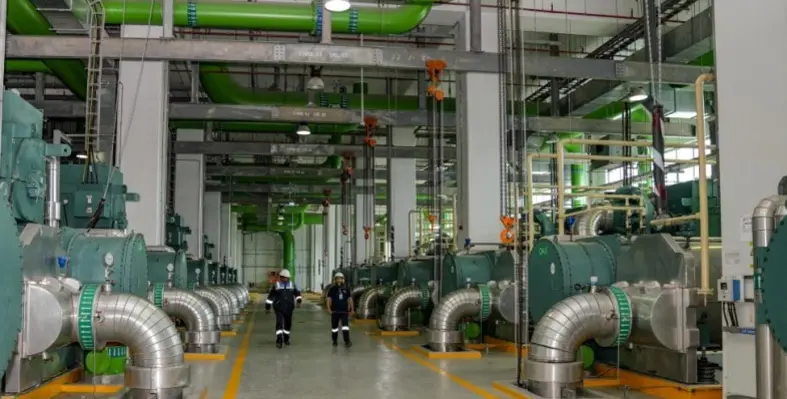Tabreed, the world’s leading district cooling company, has concluded the third phase of its ‘Tasheel’ programme – an ambitious and extensive retrofit of Variable Frequency Drives (VFDs) to increase energy efficiency and assist in the decarbonisation of its operations
Tabreed celebrated its silver jubilee in 2023 and is the Middle East’s original district cooling provider. It is, therefore, inevitable that certain plants in its ever-expanding portfolio will feature technology that has since been superseded with more energy efficient methods with lower operational and maintenance costs. While VFDs have been available for many years, their adoption in the district cooling industry’s very specialised facilities was not feasible until relatively recently.
VFDs are situated between the electrical supply and the equipment powered by it, in this case extremely large, medium-voltage industrial electric motors for the plants’ chillers. On the originally installed equipment, the motors were often designed to work at fixed speeds, meaning they turned at the same rates no matter the cooling loads. In simple terms, installation of VFDs enables regulation of the power being fed to these motors by lowering motor speeds when load is reduced, instantly making them more energy efficient. When cooling demand increases so too does the power supplied by the VFDs to the motors, and vice versa.
Tabreed’s CEO, Khalid Al Marzooqi, explained, “In 2019, our operations and maintenance department commenced a five-year efficiency plan in which we worked closely with the original manufacturers of the equipment (chillers and pumps) in some of our Abu Dhabi and Dubai plants, to better understand the impact of VFDs on energy efficiency and to retrofit where appropriate in the name of increased efficiency.
“This was a sizeable undertaking yet, over the past three years, the VFDs’ performance and the resulting energy optimisation has easily exceeded our initial, ambitious targets. Most importantly, however, retrofitting VFDs to our older plants has directly reduced energy consumption to the extent that, over the next ten years, we will save an additional 223,000,000 kWh, consequently preventing the release of a further 105,000 metric tons of CO2 emissions. Projects such as this are the very essence of Tabreed – a UAE company built on the pursuit of operational excellence.”







